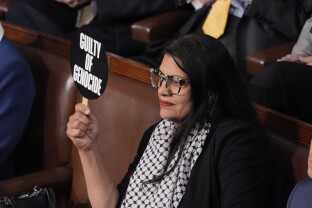The image was shared widely after Israeli Prime Minister Benjamin Netanyahu’s joint address to Congress: Rep. Rashida Tlaib, Congress’ only lawmaker from Palestinian heritage, sat in the House chamber, at times flanked by empty seats, draped in a keffiyeh, holding a sign that read “war criminal” and “guilty of genocide.”
Tlaib is not the only lawmaker in Congress deeply critical of Netanyahu’s policies and of Israel’s conduct in the war in Gaza; a growing contingent of Democrats have raised alarms about the more than 39,000 Palestinian deaths. So why was the Michigan Democrat left to protest on her own?
NOTUS spoke with several of Tlaib’s progressive allies on why they chose to boycott the address instead of protesting in the room. All emphasized they did so in solidarity with Tlaib.
Their reasonings, however, also reflect differing schools of thought within the Democratic Party around effective demonstration — a subject that has dominated discourse in American politics for years, whether about Black Lives Matter marches, climate organizers or campus encampments protesting the war in Gaza.
“I saw a picture where there was no one sitting to the left or to the right, and it was gut-wrenching,” Illinois Rep. Delia Ramirez told NOTUS. “But a reminder that this is exactly why I have to stand in solidarity with her — not just in the chamber, but more importantly, the work that we do when we leave that room.”
Ramirez said there had been some discussion about whether there should be a wider coordinated in-room disruption with allied members, but she said Tlaib hadn’t asked others to protest in the room with her, and Ramirez ultimately opted to “spend time trying to figure out: How do we keep moving the needle forward?”
Roughly half of Democrats in Congress skipped Netanyahu’s speech. The chamber was still packed, however, making the boycott a less stark visual than a sole member of Congress holding a sign that said “war criminal.” Multiple lawmakers who boycotted gave their seats to families of Israeli hostages.
Ramirez and about a dozen other boycotting Democrats attended a counter-event with Palestinian and Israeli peace activists in a House office building at the same time as the speech.
“I’m a big fan of protest, but I want to make sure my protest is actually advancing my cause,” Rep. Jim McGovern told NOTUS after the counter-event, noting that he would have just been removed if he’d tried to disrupt the speech.
House Speaker Mike Johnson sent a letter Tuesday promising a “zero-tolerance policy” for disruptions, and Capitol Police arrested at least six people in the House gallery.
Rep. Greg Casar said his decision was twofold. The peace activists felt to him like the “living counterargument to Netanyahu drumming up more war,” and secondly, he wanted the widespread absences to signal what the families of Israeli hostages he met with Wednesday thought of Netanyahu’s speech: a “stunt to try to cover up for Netanyahu’s failures.”
Disrupting in person can often send a bigger message as a protest strategy, progressive political strategist Waleed Shahid said. But in the context of traditional institutions like Congress, it was still a powerful message that more than twice as many Democrats boycotted Netanyahu’s address this time as did when he came in 2015.
“Visibilizing your discontent is always better than invisibilizing it,” Shahid told NOTUS. “It is still, to me, an act of courage and bravery to not do the thing that everybody else is doing, which is attending the speech, but Rashida took that to a higher level.”
Rep. Ayanna Pressley reiterated that skipping the speech was in direct solidarity with Tlaib — a support that extends both inside and outside the chamber.
“Our sisterhood is not a gimmick; it’s a real thing,” Pressley told NOTUS, adding that she and others celebrated Tlaib’s birthday Wednesday together after the speech. “We are in solidarity with our sister always, and we support her, and that does not mean just sitting next to her.”
Tlaib’s office did not respond to a request for comment. The congresswoman sat through the entirety of Netanyahu’s speech while other Democrats in the room stood and applauded some of his lines. At one point, a House floor staff member walked over to speak with her, during which she briefly brought down her sign before raising it again.
“I will never back down in speaking truth to power,” Tlaib wrote on X. “Palestinians will not be erased. Solidarity with all those outside of these walls in the streets protesting and exercising their right to dissent.”
—
Claire Heddles is a NOTUS reporter and an Allbritton Journalism Institute fellow.
Sign in
Log into your free account with your email. Don’t have one?
Check your email for a one-time code.
We sent a 4-digit code to . Enter the pin to confirm your account.
New code will be available in 1:00
Let’s try this again.
We encountered an error with the passcode sent to . Please reenter your email.


